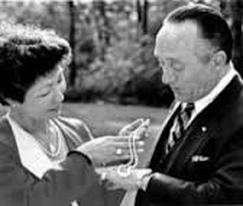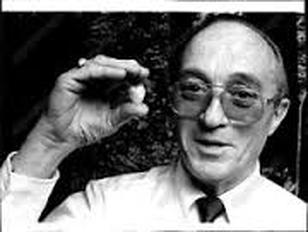In the early days of the mussel industry, the market was primarily for mother-of-pearl buttons. Until the advent of plastics in the 1930s, mother-of-pearl was the sturdiest, most beautiful and cost efficient material available for the clothing industry. As plastic gained a firm hold in the 1940s, the mussel harvest industry almost ground to a halt. It was shortly after World War II that one of America's enemies saved the freshwater shell business from extinction.
Early 1950s: a man named John Latendresse became interested in freshwater pearls and made his way south. When he found musselers (at the time basically amatuer treasure hunters and free divers) in Tennessee he offered to buy any pearls that they might find. Latendresse's passion soon led him to Japan and a new international industry was born. Japan had the first cultured pearl farms in the world, but had trouble finding high quality mother-of-pearl to implant into their oysters. To meet this need, Johnny Latendresse founded Tennessee Shell Company in Camden, Tennessee in 1954. Mussel shells from the Tennessee River soon proved to contain the highest quality mother-of-pearl in the world. This started a fresh boom in the mussel harvest game and introduced a new generation to the proffession. The Mussel Diver was born as a direct result of Latendresse's dreams and hardwork. Over the next four decades, this had an enormous impact on the economy of West Tennessee, particularly Benton Co.
Latendresse went on to found the American Pearl Company in 1961 to import Japanese cultured pearls into the U.S. This ignited another idea and passion and Johnny began a quest to gather the closely gaurded secrets of the cultured pearl. On one of his fact finding missions to Japan, Johnny was told by the CEO of a major pearl company, "We don't feel you belong in the Japanese pearl business. Mikimoto is a natural hero, we began it and we don't feel you belong in it." Latendresse snapped back with, "Henry Ford is our national hero, but look what Toyota and Honda have done with his ideas." Latendresse gathered what information he could and with over a decade of trail and era, the American cultured pearl industry was born.

John Latendresse and his wife Chessy admiring pearls.
My father met Latendresse (dad always called him Johnny) in 1979. After four years of mussel diving in four states, my father Rayburn 'Big Frizz' Frizzell, had gained a reputation as one of, if not the best diver on the water. When he came to Benton County, Johnny contacted him and asked to buy his shells. (There is a funny story about their first meeting, but I will go into that on another blog.) A friendship and business relationship was formed that spanned two decades and was mutually beneficial. My dad soon became a buyer for Tennessee Shell and in 1984 started the first dive shop geared towards the mussel diver, Big Sandy Dive Shop. Latendresse recognized the business potential of my dad, and Rayburn soon became the head shell buyer for the company. He not only had his shell camp in Big Sandy, TN, he also had buying stations in KY, OK, AL, IL, LA, and TX. My entire family was employed at the various shell camps. My brother, Bruce Frizzell, began buying at the Big Sandy camp when he was 15. Within a couple of years he took over buying at a shell camp catering to the brailers in Kentucky. When Johnny sold Tennessee Shell in the early 90s (for a reported 10 million) my dad was head of exporting and was getting a commission of .025% on every shell shipped, which at the time amounted to 3 million pounds a year. Rayburn Frizzell sold Big Sandy Dive Shop to Tennessee Shell and retired soon after Johnny Latendresse sold the company. John Latendresse passed away in 2000. His family still owns American Pearl Company in Nashville, TN.
John Latendresse is now known as the 'Father of American Cultured Pearls', and for good reason.


 RSS Feed
RSS Feed